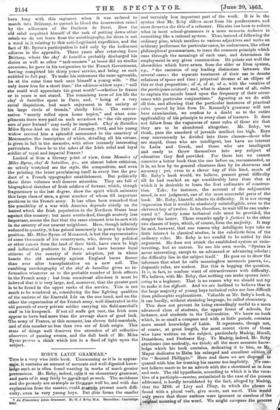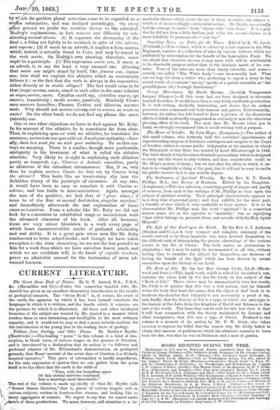we, at contains an amount of accurate and well-digested know-
quarrel with him for trusting his master too implicitly. e can- Aedge such as is often found wanting 14 works of much greater not believe macte to be an adverb with the e shortened as in bens pretensions. Mr. Roby, indeed, ce),,la it an elementary grammar, and male. The old hypothesis, according to which it is the voca- and parts of it may fairly besamideEecllis such. The accidence tive of a participle—mactus, assimilated to the case of the person and the prosody are as pimple as then well be, and with due addressed, is hardly invalidated by the fact, alleged by Madrig, explanation from the master, could eaceir,els, present much diffi- that the MSS. of Livy and Pliny, in which the phrase is culty, even te very young boys. But ahis forms the smaller found with a plural verb, give macte, not macti. This would * As Elementary Latin Grammar. By H. J. Roby, M.A. Macmillan : Cambridge. oa prove that those authors were ignorant or careless been long with this regiment when it was ordered to and 'certainly less important part of the work. It is ia the march into Brittany, to quench in blood the insurrection raised syntax that Mr. Roby (lifters most from his predecessors, and by the adherents of the Duchess de Berri. How the most deserves the title of a reformer. His aim has been to reduce\ old rebel acquitted himself of the task of putting down other what in most school-grammars is a mere memoria technica to rebels we do not learn from the autobiography, for there is not something like a rational system. Thus, instead of following the a word in it relating to this anti-Legitimist expedition, and the ordinary plan, which ascribes to various adjectives and verbs an fact of Mr. Byrne's participation is told only by the indiscreet arbitrary preference for particular cases, he endeavours, like other editress in the appendix. Three years after returning from philosophical grammarians, to trace the common principle which Brittany, where the chef de bataillon probably discharged his runs through the meanings of each case, and determines its duties as well as other " task-masters" at home did on similar employment in any given construction. He points out well the occasions, he gave in his resignation to the French Government, absurdities which have arisen from the older or Eton system, having completed his thirty years' service, and being as such e.g., " the omission of any leading distinction between the 'entitled to full pay. To make his retirement the more agreeable, several cases ; the separate treatment of their use to denote he at the same time took unto himself a young wife. " She relations of space and time ; perpetual dreams of an ellipse of only knew him for a short time," the editress-widow says ; " still this or that preposition ; of si, of ut, of o, with the vocative of she could well appreciate his great worth"—whether in francs the participium existesid ; and, what is almost worst of all, rules or in years is not stated. The remaining term of his life the to explain the meods based upon the frequency of their occur- dief de bataillon spent in Paris, and, " being of a very rence with particular conjunctions." Agreeing as we do with social disposition, had much enjoyment in the society of all this, and allowing that the particular instances of practical his large circle of friends," chiefly Irish. The conver- rules quoted by him from Dr. Kennedy's grammar will not nation " mostly rolled upon home topics," and what corn- bear examination, we confess to a doubt as to the entire pliments there were paid on such occasions to " the vile oppres- applicability of his principle to every class of learners. It does sors of poor Ireland " may easily be imagined. Chef de Bataillon not follow from the vagueness of some rules of these six that
Miles Byrne died on the 24th of January, 1862, and his young they are to be abandoned altogether. Mr. Roby, we widow erected him a splendid monument in the cemetery of think, puts the standard of juvenile intellect too high. Boys Montmartre, the inscription of which, detailing all his virtues, may conveniently be divided into three classes—those who is given in full in the memoirs, with other intensely interesting are stupid, those who are intelligent, but have no interest particulars. Peace be to the ashes of the Irish rebel and loyal in Latin and Greek, and those who are intelligent soldier of royal and imperial France ! and ready to throw themselves into any subject of ledge which his book contains, dedicating it to him, as ROBY'S LATIN GRAMMAR,.* Mayor dedicates to Hahn his enlarged and excellent editio
of thet!. onkkilnal meaning of the word. We might compare the process by wt..ich the genitive plural sestertium came to be regarded as a nei r substantive, and was declined accordingly. On every er ground we prefer the vocative theory to the adverbial. ko.drig's explanations, in fact, remove one difficulty by sub- stituting several others. (1) It supposes the shortening of the final e, a thing not lightly to he assumed, in spite of rite, interne, and superne ; (2) if made be an adverb, it implies a form mactus, which, indeed, is actually found in Cato, and may be traced in the verb macto. On Madrig's own showing, therefore, made might be a participle. (3) The expression macte esto, if macte is an adverb, is, to say the least, a very unusual one. Allowing that macte esse might stand by itself, like frustra esse, impune esse, how shall we explain the ablative which BO consistently follows it ; or the fact that the verb is always in the imperative, either directly or in cratia oblique? The fact would seem to be that (mago) mactus, nzacto, stand to each other in the same relation as augeo, auctus, aucto. Catullus could say, virtutibus augere, ope auctore, transitively ; taedis auctus, passively. Similarly Cicero sums mactare honoribus ; Plautus, Enrius, and Afranius, mactare malo. Why should not mactus correspond to audits, as mad() to aucto? On the other hand, we do not find any phrase like aucte (adverb) esse.
One or two other objections we have to find against Mr. Roby. In his account of the ablative he is sometimes far from clear. Thus, in explaining opus est with an ablative, he translates the sentence, auctoritate tea opus mild est, I need your authority—liter- ally, there is a work for me with your authority. To us this con- veys no meaning. There is a similar, though more pardonable, ambiguity in his treatment of what is called the ablative absolute. Very likely he is right in explaining such ablatives partly as temporal, e.g., Cicerone et Antonio consulibus, partly as ablatives of the attendant circumstance. But, if so, why does he explain auctore Cassio lex late est, by Cassius being the adviser? This looks like an involuntary slip into the forbidden theory of the participle of existence. At any rate, it would have been as easy to translate it with Cassius as adviser, and less liable to misconstruction. Again, amongst the uses of the genitive, we find that of "place where ; if noun be of the first or second declension, singular number," and immediately afterwards the real explanation of these cases as locatives. From a scholar like Mr. Roby we did not look for a concession to established usage so inconsistent with the advanced character of his book. After all, however, these are very minor blemishes in a work every page of which bears incontrovertible marks of profound scholarship and real ability. It is a great gain when men like Mr Roby condescend to write school-books ; and though we have taken exception to the term elementary, we are not the less grateful to Lim for a work from which we have ourselves learnt much, and which we are confident will, iii the hands of capable teachers, prove an admirable manual for the instruction of more ad- vanced learners.































 Previous page
Previous page